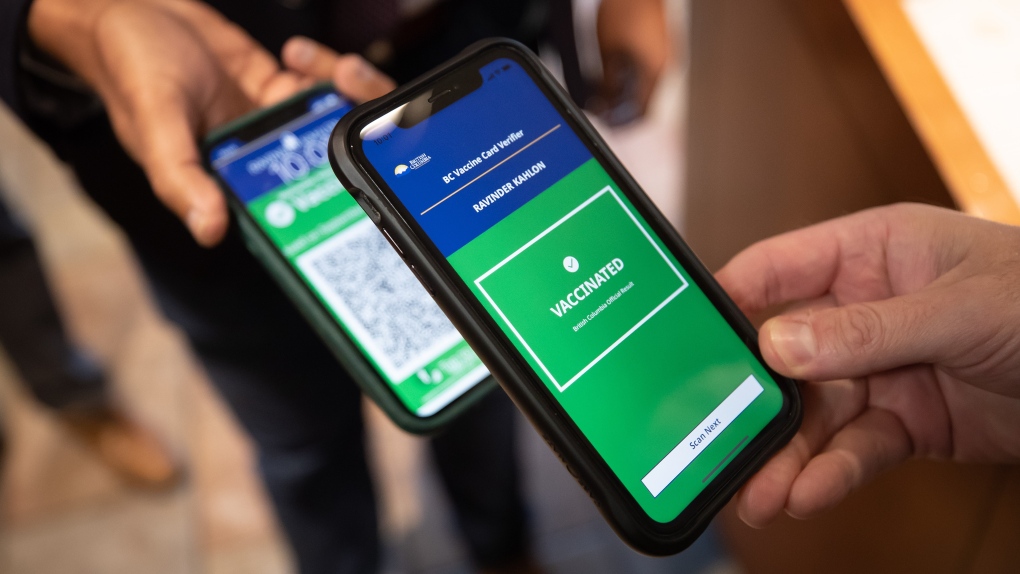
B.C.'s vaccine card rollout left many seniors confused and frustrated, researchers say
 B.C. Minister of Jobs, Economic Recovery and Innovation Ravi Kahlon has his provincial COVID-19 vaccine card scanned by White Spot restaurant general manager Bill Warwick, before having breakfast in Delta, B.C., on Wednesday, Sept. 15, 2021. (Darryl Dyck / THE CANADIAN PRESS)
B.C. Minister of Jobs, Economic Recovery and Innovation Ravi Kahlon has his provincial COVID-19 vaccine card scanned by White Spot restaurant general manager Bill Warwick, before having breakfast in Delta, B.C., on Wednesday, Sept. 15, 2021. (Darryl Dyck / THE CANADIAN PRESS)
The rollout of B.C.'s vaccine card system left many seniors feeling confused, frustrated and inadequate, according to researchers from Simon Fraser University.
After speaking with more than 500 seniors, the team at SFU's Science and Technology for Aging Research (STAR) Institute aruthe province failed to properly consult with seniors and seniors' advocates before implementing the proof-of-vaccination requirement.
"A lot of seniors I spoke to asked, why didn't they consult us? Why didn't they ask for our opinions?" said Hannah Shin, a community-based researcher in the STAR Institute.
"That was the biggest one. The second was, what ever happened to mail-outs? Not everyone has access to digital technology, particularly people on the lower end of the income spectrum. We need to think about how we're making information accessible."
The province's vaccine card system was implemented in September, and requires B.C. residents to present a personal QR code – either physical or digital – when accessing restaurants, movie theatres and other non-essential services.
When accessing the QR code on a smartphone, there was notably no clear button to download it at launch, meaning users were required to take a screenshot for easy access. That was something some seniors struggled with, Shin said.
"If you grew up with technology, taking a screenshot is not that difficult," she said. "If you didn't grow up with technology, you might wonder, where does that picture get stored? If you take a lot of pictures, you might need to scroll to find it. You're left with this frustration – here's the QR code, you screenshotted it, but where did it go?"
The researcher said many seniors engage comfortably with technology, and others are eager to do so but lack digital literacy. Some of them were forced to stop taking in-person computer classes because of the pandemic.
"The big issue is the digital divide and how it impacts seniors in B.C., and the vaccine card rollout is just one example of that," Shin said.
"During the pandemic, when you needed it the most, a lot of people did not have access to digital technology or didn't know how to use it. That was creating a lot of anxiety and fear. A lot of older adults are very capable and independent, but sometimes struggle to ask for help."
The government did provide a phone option for vaccine card registration, and mailed out physical QR codes to those who requested one. The vast majority of seniors who were consulted for SFU's research were using a physical QR code.
Some of the messaging and labelling also caused confusion, the team found, noting some seniors initially believed "vaccine card" meant the wallet-sized card they received while getting their shots.
Much of the subsequent support and technical assistance for those seniors fell to community groups, according to Shin, who also works for the 411 Seniors Centre in Vancouver.
"A lot of them would come to 411 and our program staff would assist our community members to get their QR," she added.
To ensure a smoother process for rolling out a similar system in the future, the researchers recommended that government do more consultations with seniors and seniors' groups, use clear language that avoids technical jargon, and provide more information through traditional methods such as TV advertisements and direct mail.
CTVNews.ca Top Stories

From essential goods to common stocking stuffers, Trudeau offering Canadians temporary tax relief
Canadians will soon receive a temporary tax break on several items, along with a one-time $250 rebate, Prime Minister Justin Trudeau announced Thursday.
'It didn't sound good': Mother shares what her sons went through with walking pneumonia
A mother shares with CTVNews.ca her family's health scare as medical experts say cases of the disease and other respiratory illnesses have surged, filling up emergency departments nationwide.
BREAKING Matt Gaetz drops bid for Trump attorney general in face of U.S. Senate opposition
Hardline Republican Matt Gaetz withdrew his name from consideration as U.S. president-elect Donald Trump's attorney general, in the face of opposition from the Senate Republicans whose support he would have needed to win the job.
Mother charged after infant dies in midtown Toronto: police
The mother of an infant who died after being found at an apartment building in midtown Toronto on Wednesday has been charged with failing to provide the necessaries of life.
Here's a list of items that will be GST/HST-free over the holidays
Canadians won’t have to pay GST on a selection of items this holiday season, the prime minister vowed on Thursday.
Manitoba RCMP issue Canada-wide warrant for Ontario semi-driver charged in deadly crash
Manitoba RCMP have issued a Canada-wide arrest warrant for the semi-driver involved in a crash that killed an eight-year-old girl and her mother.
2 arrested during Greenpeace protest outside Stornoway residence in Ottawa
Two people have been arrested following a protest outside Stornoway, the official residence of Canada's leader of the Opposition.
Arrest warrant issued for suspect charged in Toronto airport gold heist
Peel police say a bench warrant has been issued for the arrest of one of the suspects charged in connection with the gold heist at Pearson International Airport last year.
'This is cold': P.E.I. mother upset over decision to remove late daughter's photos from school memorial wall
A high school on Prince Edward Island is removing pictures of its late students from a memorial wall – a decision that has upset one mother whose daughter attended the school.




























